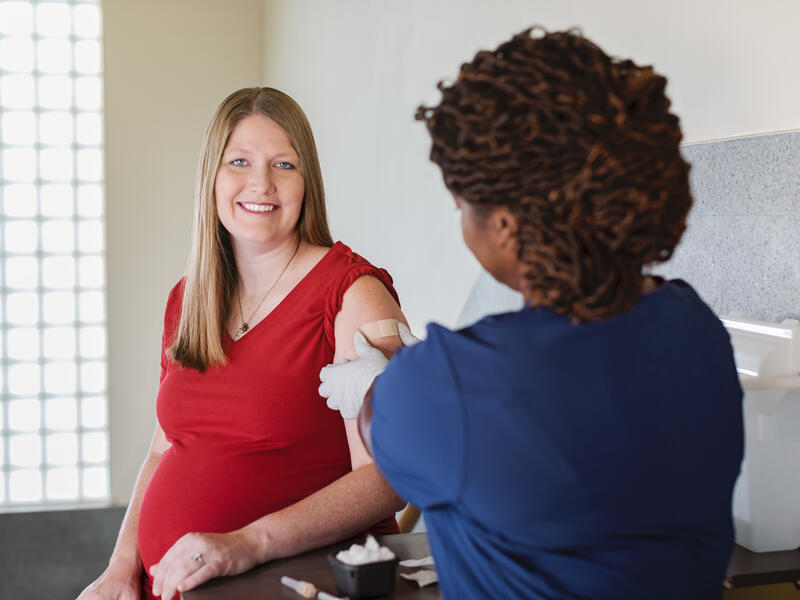RSV (respiratory syncytial virus) is a common virus that causes symptoms such as a runny nose, decrease in appetite, coughing, sneezing, fever and wheezing.
Though it mimics the symptoms of the common cold, it can lead to more serious problems than a standard cough and runny nose.
In 2023, the public gained new tools to help prevent severe RSV – infections becoming serious enough to send you to the hospital – with the first immunizations against RSV.
To prevent severe RSV disease in infants, the U.S. Centers for Disease Control and Prevention recommends either maternal RSV vaccination or infant immunization with RSV monoclonal antibodies. Most infants will not need both. The CDC recommends:
RSV vaccine for pregnant people
- 1 dose of maternal RSV vaccine during weeks 32 through 36 of pregnancy, given September through January. Pfizer Abrysvo is the only RSV vaccine recommended during pregnancy.
RSV immunization for infants and young children
- 1 dose of the monoclonal antibody product, nirsevimab, for all infants younger than 8 months born shortly before or are entering their first RSV season.
- 1 dose of nirsevimab for infants and children ages 8–19 months who are at higher risk for severe RSV disease and entering their second RSV season. Considered higher risk are:
- American Indian and Alaska Native children
- Children with chronic lung disease of prematurity who require medical support during the 6 months before the start of their second RSV season
- Children who are severely immunocompromised
- Children with severe cystic fibrosis
RSV vaccine for adults ages 50+
- CDC recommends an RSV vaccine for everyone ages 75 and older and adults ages 50-74 at increased risk of severe RSV.
- Adults 50-74 who are at increased risk include those who:
- Have chronic heart or lung disease
- Have certain other chronic medical conditions
- Are residents of nursing homes or other long-term care facilities
- Are immunocompromised
- RSV vaccine data now shows the vaccine provides protection for at least two years.
- The best time to get vaccinated is in late summer and early fall — just before RSV usually starts to spread in the community.
If you have any questions about RSV or immunizations, talk to your health care provider.
“The overall goal is not just to reduce hospitalizations but to reduce the complications associated with an RSV infection,” said Dubert Guerrero, M.D., who practices internal medicine and specializes in infectious diseases and travel medicine at Sanford Medical Center Fargo in North Dakota.
Impact of RSV
RSV does not usually cause severe illness in healthy adults and children, according to the CDC. However, some people with RSV infection, especially older adults and infants younger than 6 months of age, may need to be hospitalized.
In the United States, RSV is the most common cause of bronchiolitis (inflammation of the small airways in the lungs) and pneumonia (an infection of the lungs) in children younger than one year old, the CDC reports.
Each year in the United States, the CDC estimates RSV leads to:
- 1 million clinic visits among children younger than 5
- 58,000 to 80,000 hospital admissions among children younger than 5
- 100,000 to 160,000 hospital admissions among adults 60 years and older
“It is a significant illness,” Dr. Guerrero said. “It is also seasonal, meaning that this time of year – from October to April – is when we see typically see more of it in the United States.”
So what is the best course of action? To start with, familiar flu season guidelines also apply to avoiding RSV. This includes getting immunized, washing your hands, staying home if you’re sick, and avoiding close contact with people who are sick.
“You can get RSV from somebody who is coughing near you,” Dr. Guerrero said. “It enters though your mouth, lungs, your nose and your eyes. It can be transferred to a surface and if you then touch that surface, you can get it by touching your mouth or eyes. Make sure you wash your hands often and cover your nose and mouth when you’re coughing and sneezing. For little kids, make sure their toys are washed frequently, especially if they’re shared toys.”
Where to get RSV vaccine
Sanford Health encourages you to talk with your primary care provider about an RSV immunization. RSV immunizations are available at Sanford Health clinics near you.
Find more information about immunizations at Sanford Health.
Learn more
- Is it a cold or RSV? Know when to call your child’s doctor
- Nurse thankful for new RSV treatments after son’s scare
- Why do we get sick more in the winter?
…
Posted In Children's, Family Medicine, Fargo, Healthy Living, Immunizations, Internal Medicine, Pregnancy, Senior Services
